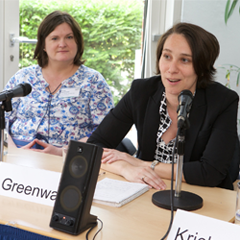By Julie Greenwalt, Cities Alliance Urban Environment Specialist
[31 May 2017] -- During the Resilient Cities Congress hosted by ICLEI and held in Bonn, Germany earlier this month, I had the privilege of facilitating a session on “Bottom-up urban resilience: measuring community and individual capacities” organised by WRI. The panel session included three excellent panellists: David Dodman from IIED and Shiraz Wajih from the Gorakhpur Environmental Action Group, and Lubaina Rangwala from WRI India, who presented on the Urban Community Resilience Assessment (UCRA).
The UCRA collects information from the household level to analyse social cohesion, familiarity with local climate risks, early warning systems and disaster readiness. The UCRA was developed by WRI and applied in Brazil, and now with support from Cities Alliance and in partnership with 100RC and SDI, it is being expanded to Surat, India and Semarang, Indonesia.
To get the audience involved, I asked some variations of the questions involved in the UCRA, for example:
-- Do you know the name and phone number of at least three of your neighbors? This helps to assess community connectivity which is important in disaster response and a network of support.
-- Do you know if your home is in a floodplain? Many resilience assessments want to understand awareness of exposure.
I also asked how many people have had to evacuate from their home and I was surprised to see about a third of participants raise their hands. Although this was not a scientific study, the room was largely composed of practitioners from international organizations and NGOs and, to a lesser extent, national and local governments. I was genuinely surprised that so many of us have had to evacuate our homes due to an emergency, crisis or disaster.
Then I asked how many people have a disaster preparedness or emergency supply kit at home – a question asked in the UCRA, and a criterion on which we judge neighbourhoods where we work. One single person answered in the affirmative.
I wondered why those of us in the room blithely ignore the advice of experts to be prepared and ultimately be responsible for our own resilience, even though many of us have experienced disasters or emergencies. And I questioned if we are expecting too much or unfairly evaluating local communities in developing countries on a standard that we ourselves – with resources and awareness – choose to ignore.
Perhaps it is human nature to believe that you won’t be the victim of an unexpected disaster or crises. Perhaps we believe that we have the access and agency that we need – energy, water, food, ICT connection – and that this access won’t be cut off, even in the face of a disaster.
Is that why we expect local communities in developing countries to have disaster preparedness kits when we do not? Do we assume that they don’t have the agency and access so they need to have a reserve? Will that make them more resilient, while we believe that we can make ourselves more resilient? What else could help us to address this gap in agency and access in building one’s own resilience?
All of us at the Resilient Cities Congress want cities to be more resilient, yet many of us don’t take the steps to increase our own resilience. As climate change intensifies alongside increasing urbanisation, the landscape of the planet is changing faster in our lifetime than any other. There is a lopsided relationship involved with this transition. Many of us are getting swept up in this change whether we have planned for it or not. As we work to help cities and local communities plan, we need to remember that ownership and agency is critical to resilience. Building resilience starts at home – in yours, mine, and in the communities where we work.
The opinions in this piece are those of the author and do not represent the views of the Cities Alliance.
Julie Greenwalt at the 2017 Resilient Cities Congress in Bonn, Germany. Photo: ICLEI.

I wondered why those of us in the room blithely ignore the advice of experts to be prepared and ultimately be responsible for our own resilience, even though many of us have experienced disasters or emergencies.
Related Items:




